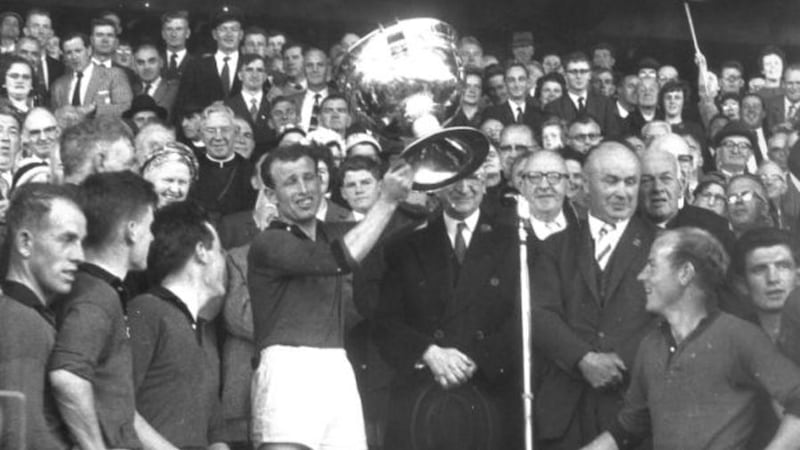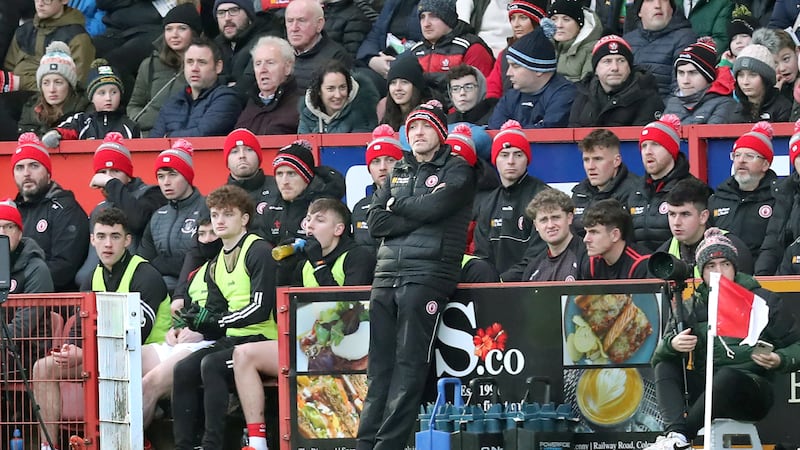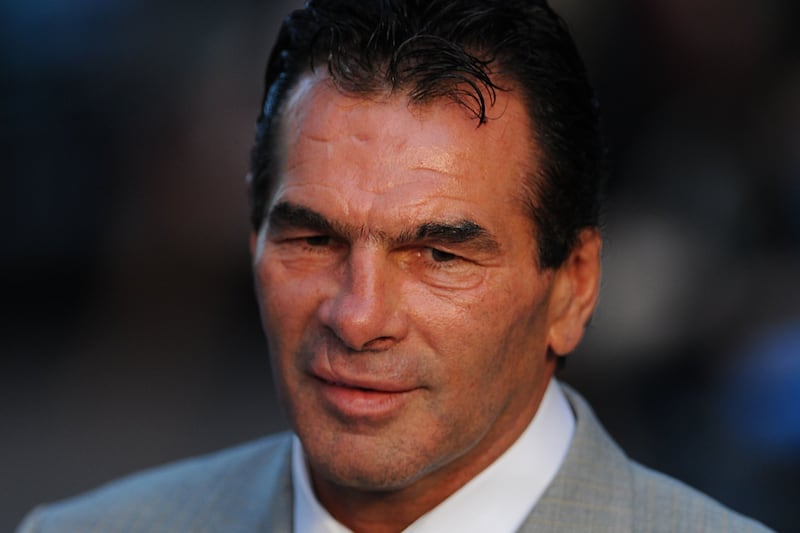IN an extract from his memoir ‘The Making of Paddy Mo, The Paddy Doherty Autobiography’, which will be launched on Monday, August 10, Paddy Doherty remembers the greatest game of his life in Croke Park and also recounts how a career which included three All-Ireland victories might have been cut short by a decision to make it as a professional soccer player in England.
Sean Kelly (Former GAA President):
As a young lad growing up in the Kingdom, I believed in Kerry’s invincibility. But Down shattered all that. Paddy Doherty was their chief predator. Without doubt one of the greatest forwards the game has known… loved and admired in Down… feared and respected in Kerry and everywhere else.
HE wasn’t Paddy Doherty back then.
And he’s still not Paddy Doherty, even now, to those who can recall his amazing exploits on the football field.
The man was a true hero to his people, and GAA folk all over the country knew him only as a larger-than-life, comic book hero.
With his red and black Superman cape on?
It was, and still is, simply… Paddy Mo.
‘That name,’ he now explains, ‘It didn’t come from Mo, Larry and Curley, in The Three Stooges.’
Paddy says the person who gave him the name was his godfather, Malachy Doherty who named the Down star after Maureen Connolly, the lightning fast American tennis player who was universally known as ‘Little Mo’.
****
PADDY MO CAME on as a 40 year-old substitute for the ‘Island in the 1974 Down championship final against Bryansford. It was his last throw of the dice, his last opportunity to pick up that elusive Down senior championship medal. He had previously played in two finals for Ballykinlar, both against Newry Mitchels.
Each time, a painful loss.
Things were not to change in his last championship match. He did score twice from free-kicks but, nonetheless, Loughinisland went down 3-5 to 0-8. Maybe, had he been on from the start his team might have fared better. The losers kicked 14 wides.
‘A Down senior championship was the one major medal I never won and Loughinisland wanted me to get that medal. But I don’t think I was destined to be a Down championship winner.
‘The next year, after I left, Loughinisland won the championship when they beat Rostrevor.’
However, despite not winning that Down championship medal, Paddy had a long trophy-filled career with lots of highs – and of course a few lows as well.
He scored almost 1,000 points (962 to be precise) at county level when games were just 60 minutes long; setting a national record in 1960 with 13 goals and 19 points in major games. He also was a top marksman in the Ulster championship on four occasions.
In 1958 with three goals and 14 points.
In 1959 with one goal and 17 points.
In 1961 with one goal and 16 points.
And in 1968 with one goal and 17 points.
Furthermore, five times in Ulster championships games he scored at least 10 points. When he finished his career, he was the overall leading scorer in Ulster championship football with 15 goals and 159 points (204 points), including a record total of six goals and 41points in Ulster finals.
Add on, of course, over 4,000 points he took in club football.
****
PADDY DOHERTY, AND his half-forward buddies, Sean O’Neill and James McCartan, were the obvious dangermen on that Down team in the 1960s; men who could be relied upon to always grab the vital scores.
Together, they scorched opposing defences.
‘James McCartan seemed to take much of the abuse,’ Paddy remembers, ‘… drawing the backs, leaving us wing-forwards with space to move.
‘We always seemed to know what was in each other’s minds. We played so often together that we developed a pattern and understanding.
‘It was almost… like a telepathic awareness.
‘I would act as a sort of poacher, waiting for the breaking ball from midfield. Then, if I kicked the ball down the middle, James would be waiting there.
‘Or out to the far wing… where Sean would take it.
‘Otherwise I would dart down the wing to draw the backs and open it up, or else go through on my own if the path was clear.’
****
IN 1957 PADDY Doherty formally turned his back on the game that was always his first love in order to seek his football fortune across the shuck.
Lincoln City FC, in England’s East Midlands, wanted to see more of Paddy Doherty after hearing about his performances for a Downpatrick team called Rathkeltair against an army select Xl. In that game the budding Doherty displayed his goal-scoring ability by netting five times.
Paddy was helped in his decision-making by a rough-house Gaelic football match in which he had three teeth knocked out.
At the time Lincoln City played in Division Two of the English Football League, or the present-day equivalent of the Championship. His trial with the English team, nicknamed The Imps, was watched by over 2,000 spectators. Doherty scored four goals, and missed a penalty kick.
He was offered a contract.
‘I stayed eight weeks with Lincoln,’ Paddy remembers. ‘We trained in the mornings and had the afternoons off. Three times a week we did sprints on a cinder track and sometimes over hurdles. And once a week we did a six-mile hike.
‘We also had plenty of ball practice, and for some reason we played a lot of tennis. The club coaches said it would improve our legs, eyes… reflexes.
‘And, we were massaged regularly, something that wasn’t on offer back home in the GAA dressing-room.
‘I enjoyed it. The club had one of the best pitches in the league… Sincil Bank. Also, I got on well with all the boys. Jimmy Munroe had previously played for Shamrock Rovers. Dick Neill who was an English B international… they were good boys. I played a few games for the reserves, and the club had fixed me up with a good job.
‘After a few weeks the manager told me I was certain to make the grade. Big money figures began dancing around in my head.
‘But I was getting homesick.
‘A letter from my mentor, Father Darragh arrived one day. There was a 10-pound note inside it. He wrote that if I didn’t like it in England to come home.
‘That made my mind up for me.
‘I packed my bags one Saturday night.
‘I’m away! I told the landlady of the house I was staying in. The next day I was back in Ballykinlar.
‘My father didn’t want me to go to England, and when I left for Lincoln he took ill and didn’t recover until I came back home.
‘I knew I was going to receive a year’s suspension from the GAA for playing foreign games… so I signed amateur forms for Ballyclare Comrades in the Irish B Division. When I arrived for my first match with Ballyclare the goalkeeper failed to turn up.
‘I offered to play in goals… did so, and kept a clean sheet.
‘Usually, I played outside left for Comrades and scored 33 goals in half a season. But the B Division was tough and I got a lot of abuse. In one match against Coleraine I got a real kicking. It was mad. Some Ballyclare fans rushed the pitch… threatened to kill the player who gave me the rough time.’
Doherty travelled with Bill Oakes on a motorbike to the matches.
***
Down v Offaly.
August 14, 1960.
Croke Park.
Simply one of the classic games in GAA history.
It was ‘only’ an All-Ireland semi-final but it was an extended contest worthy of a final, any year, any decade.
It had everything.
60 minutes of red-hot excitement.
Brilliant football.
Controversy.
Paddy Doherty the game of his life.
1-7.
He was immaculate and menacing from first to last.
‘I can safely say it was my best ever game,’ he agrees all these years later.
‘We were struggling… were three points down with eight minutes left.
‘When we got the penalty…
‘I had to score it!’
It was also an afternoon with a miracle.
‘Tony Hadden was soloing through at one stage, but he knocked the ball too far in front of him. I nipped in… grabbed the ball.
‘And put it over the bar with my right foot.
‘It was the one and only time I ever pointed with my right.
‘Ever!’
Trailing by seven points at half-time, and by five with 15 minutes left, the Mournemen showed immense character to chisel out a result. It might not have been the result they had hoped for, but a 1-10 to 2-7 draw meant they lived to fight another day.
Offaly were in the All-Ireland semi-final for the first time. They began with a strong breeze at their backs, and they scorched from the traps as teams first time of asking tend to do. In the opening 10 minutes they scored four points.
It was 0-4 to 0-0.
But Down clawed three points back in the next nine minutes, two scores coming from Patsy O’Hagan and one from Doherty. However, Offaly then stepped up the tempo and netted twice before the interval.
And things could have been worse for Down as Eddie McKay had made several fine saves and one shot had clipped the Mourne post.
It was 2-4 to 0-3 at the break, and Down seemed to be on their way out of the championship. As the teams went in at half-time Waterford referee Tom Cunningham was most certainly not the flavour of the month in the Down changing-rooms as it appeared as though McKay had been bundled over the line for one of the Offaly goals, ball and man.
But he also wouldn’t have been the flavour of the month with Offaly after the match.
Playing with the wind, Down began the second-half in a determined mood. The deadly Doherty knocked over three super-quick scores, with Patsy O’Hagan also on target. With just five minutes played in the second half Down were back in contention.
The excitement was mounting.
Offaly though were still in front and stretched the gap with two more scores.
The on-song Doherty kept Down’s hopes alive with a further couple of excellent points. At this stage, with Tony Hadden having moved to midfield, the Mournemen were laying siege on the Offaly goal, but their keeper, Willie Dolan saved brilliantly from Hadden and twice from Breen Morgan. Also, defender Paddy McCormack made a goal-line clearance from James McCartan.
Eight minutes were left.
Three points adrift.
Then… controversy.
The so-strong and bustling James McCartan got the ball but was immediately surrounded by Offaly defenders. The referee awarded Down a penalty kick.
Every Offaly person on the field and in the ground went berserk.
Offaly folk saw McCartan charging.
They saw a free out, no penalty.
James McCartan though was emphatic that the official was correct.
‘I was standing on the edge of the square when I got the ball,’ he recounts. ‘I took one step forward and several Offaly defenders pulled me around. I was facing outfield when the referee blew the whistle.
‘Offaly people said I was charging goal-wards and insisted that it should have been a free out. Some media commentators agreed with that opinion. But, if I had been charging goal-wards, as they alleged, I would have been facing the net.
‘This was not the case… it was a definite penalty.’
It was one of the most dramatic moments in the football life of Paddy Doherty as he stepped up to take that vital kick.
The tension was as thick as pea soup.
Utter silence.
Paddy Doherty stayed calm
He swung his lethal left foot.
Willie Nolan dived correctly, but Doherty’s fiercely struck drive sizzled into the back of the net.
The stadium erupted.
Down were level.
‘My mother was sitting in the stand as I went up to take the penalty and friends later told me she was shouting… hoarsely, “Don’t take it son” ’ Paddy Doherty tells it.
‘Obviously I never heard her but it would hardly have mattered… I would have taken it anyway. I slammed the ball past my good friend Willie Nolan.
‘Also, my father took a weak turn while watching me taking that penalty… he never again went to see me play… not even in the All-Ireland finals.
‘I wasn’t nervous as I stepped up to take the kick. I just looked at the back of the net where the goalkeeper was standing and decided which side I was going to put the ball.
‘I never had any intention of missing. I’d say the ball was in the net and out again before Willie moved.
‘It was only the next day when I thought about it, I wondered… What would have happened had I missed?'
*‘The Making of Paddy Mo, The Paddy Doherty Autobiography’ (with Tony Bagnall) is published by Hero Books and will be available from Monday, August 10 in all good book shops and also online (print or ebook) on Amazon, Apple and all quality digital stores.







